Overview
This article presents ten AI software development solutions that are poised to significantly benefit SaaS product owners. It underscores a range of tools and frameworks, including:
- GitHub Copilot
- TensorFlow
- AI analytics tools
These collectively enhance efficiency, improve code quality, and facilitate data-driven decision-making. Ultimately, these solutions empower SaaS providers to innovate and sustain a competitive edge in their markets. By leveraging these advanced technologies, SaaS product owners can not only streamline their development processes but also position themselves as leaders in their respective fields.
Introduction
In an era defined by rapid technological advancement, software-as-a-service (SaaS) product owners must strategically leverage innovative tools to enhance efficiency and drive growth. The integration of artificial intelligence (AI) into software development offers a significant opportunity for these leaders to streamline processes, improve code quality, and elevate user experiences. Yet, with a multitude of AI solutions available, how can SaaS owners identify the tools that will genuinely transform their development workflows and yield measurable results? This article delves into ten cutting-edge AI software development solutions specifically designed for SaaS product owners, uncovering the key benefits and strategic advantages they can unlock.
SDA: Custom Software Development with AI Integration
SDA stands at the forefront of custom software development, expertly integrating AI technologies to deliver innovative solutions tailored to the distinct needs of diverse industries. By harnessing the power of AI, SDA not only elevates client experiences but also drives business growth, positioning itself as a vital strategic partner for software-as-a-service providers.
The incorporation of AI facilitates the creation of smarter applications that adapt to user behavior, optimize processes, and yield valuable insights. This ultimately enhances operational efficiency and secures a competitive edge in the marketplace.
Choose SDA to transform your software solutions and unlock new opportunities for success.
GitHub Copilot: AI-Powered Code Suggestions for Developers
GitHub Copilot serves as a transformative AI-powered coding assistant that delivers real-time code suggestions and completions, significantly enhancing developer efficiency. By intelligently analyzing the context of the code being written, Copilot proposes entire functions or code snippets, allowing developers to focus on higher-level design and logic instead of getting bogged down by repetitive tasks. This capability not only accelerates the development process but also improves code quality, making Copilot an essential resource for software product teams aiming to utilize AI software development solutions to optimize their workflows.
Developers utilizing Copilot have reported that they can complete coding tasks up to twice as fast with generative AI, achieving a remarkable 26% increase in overall productivity. Furthermore, the tool has been shown to boost weekly code commits by 13.5% and compilation frequency by 38.4%, underscoring its significant impact on agile development practices. As software-as-a-service projects grow increasingly complex, the integration of AI software development solutions, including AI-powered coding assistants like GitHub Copilot, is reshaping coding practices, empowering teams to innovate more rapidly and effectively.
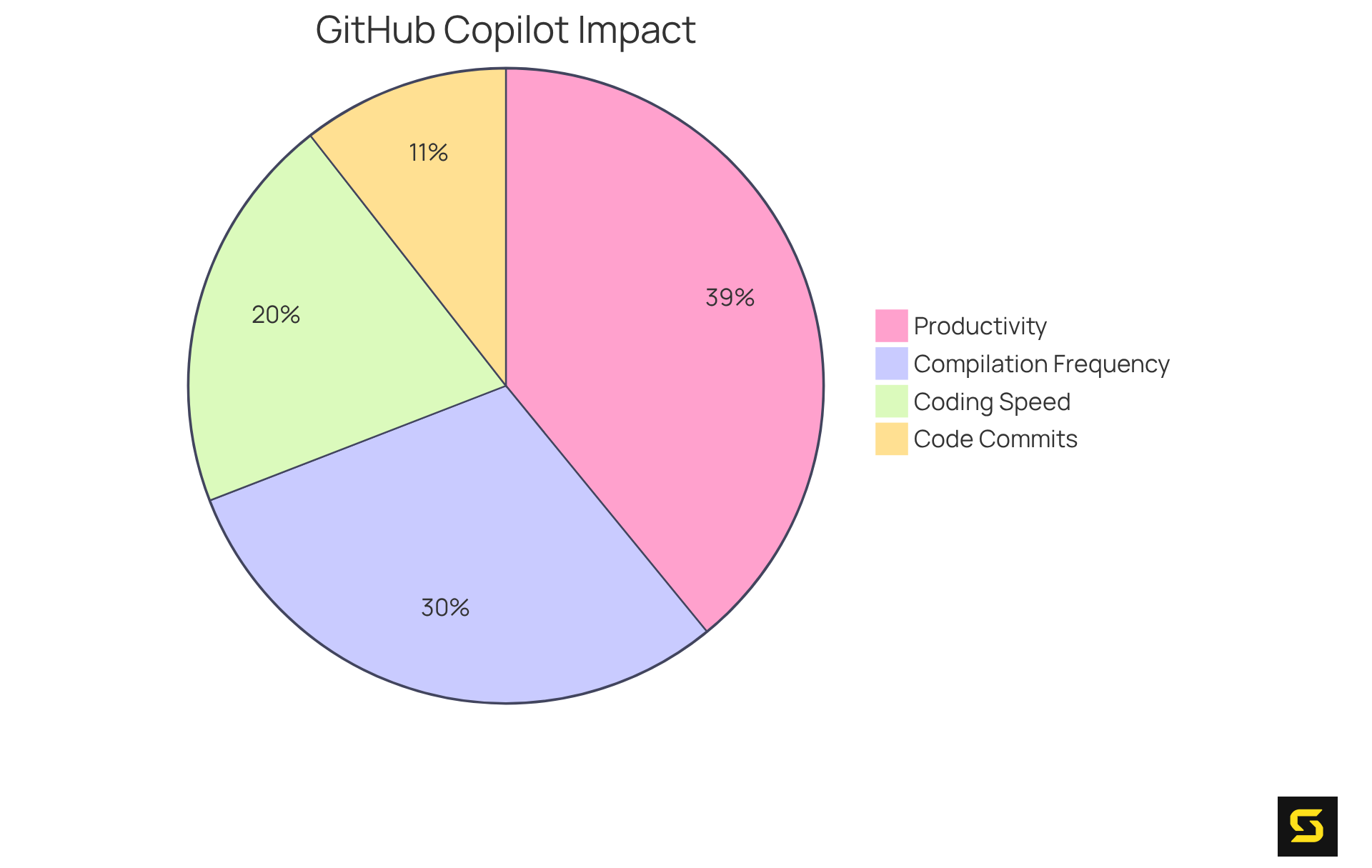
TensorFlow: Building Intelligent Applications with Machine Learning
TensorFlow stands as a formidable open-source machine learning framework, empowering developers to create and deploy intelligent applications across diverse domains. Its inherent flexibility and scalability cater to a wide array of applications, ranging from straightforward predictive models to complex neural networks. Software as a Service (SaaS) owners can utilize AI software development solutions, including TensorFlow, to enhance their applications with advanced capabilities such as image recognition, natural language processing, and predictive analytics, ultimately delivering more personalized and efficient user experiences. Notably, the global machine learning market is projected to reach $113.10 billion by 2025, underscoring the escalating demand for such functionalities in software solutions.
The framework's extensive community support and abundant resources facilitate rapid development and deployment, enabling teams to innovate swiftly. Successful applications of TensorFlow in cloud services are evident in healthcare, where AI software development solutions have significantly improved patient care and operational efficiencies. For instance, the global AI in healthcare market, valued at $19.27 billion in 2023, is anticipated to soar to $613.81 billion by 2034, reflecting the increasing integration of AI technologies. Furthermore, 66% of patients surveyed expect their healthcare providers to adopt generative AI to enhance online and phone support, highlighting the growing demand for AI-driven solutions in this sector.
Moreover, SaaS creators utilizing TensorFlow have reported substantial improvements in engagement and satisfaction among clients. As one owner remarked, "TensorFlow has transformed our approach to machine learning, enabling us to provide insights that genuinely resonate with our audience." This sentiment is echoed across various sectors, where companies harness TensorFlow to drive innovation and maintain a competitive edge in the rapidly evolving digital landscape. Additionally, organizations like AXA have successfully implemented TensorFlow to predict the likelihood of serious car accidents with 78% accuracy, demonstrating its effectiveness in real-world applications. This illustrates the framework's potential not only to enhance user experiences but also to deliver tangible business benefits with AI software development solutions.
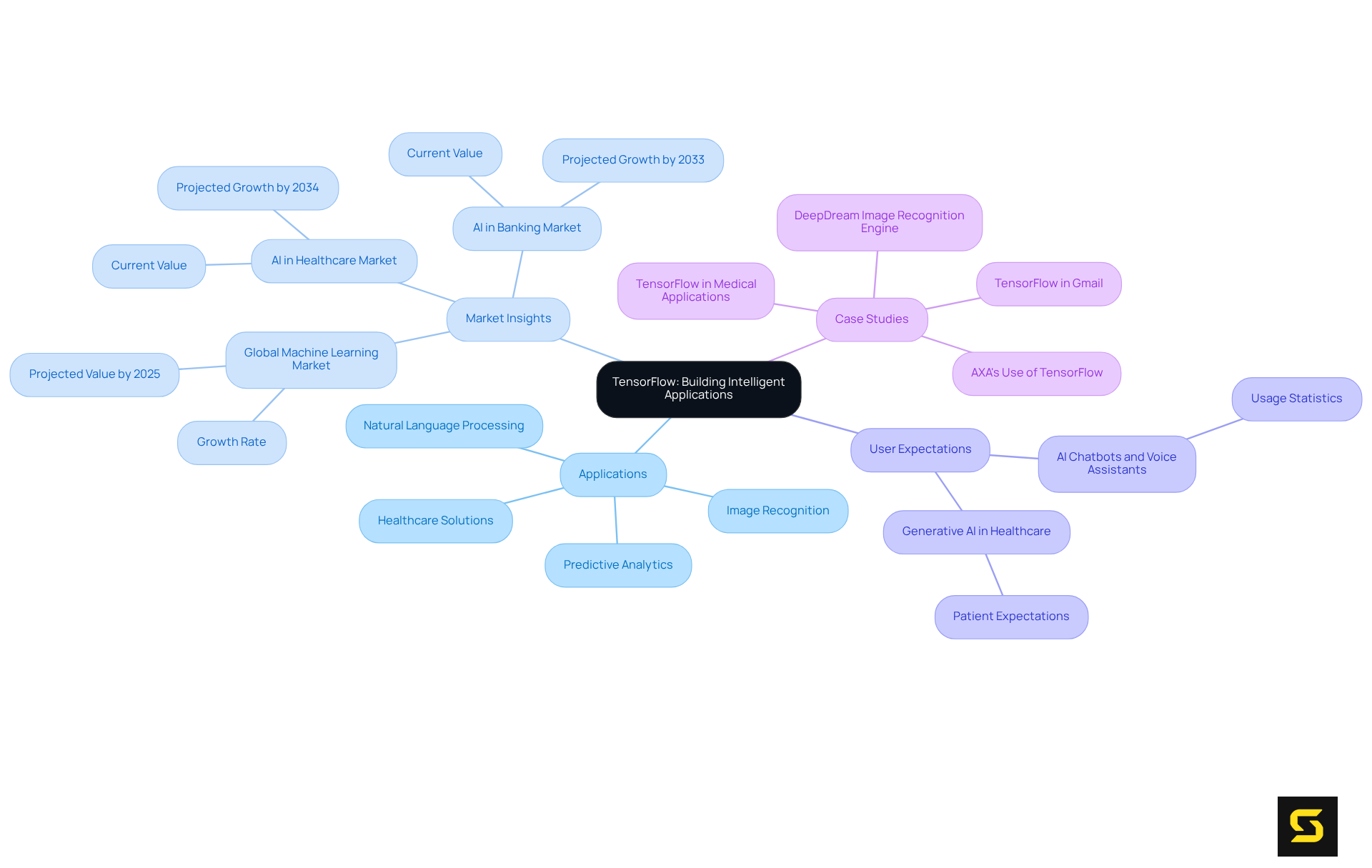
PyTorch: Flexible Framework for Advanced AI Development
PyTorch stands as a dynamic machine learning framework, providing a flexible and intuitive approach to constructing AI models. Its design facilitates effortless debugging and rapid prototyping, rendering it an ideal choice for both researchers and developers.
For Software as a Service owners, PyTorch is instrumental in crafting advanced AI software development solutions that require intricate data handling and real-time processing.
Moreover, the framework's robust support for GPU acceleration significantly enhances performance, empowering the development of high-performance applications that can scale effectively.
Embrace the power of PyTorch to elevate your AI initiatives and achieve remarkable outcomes.
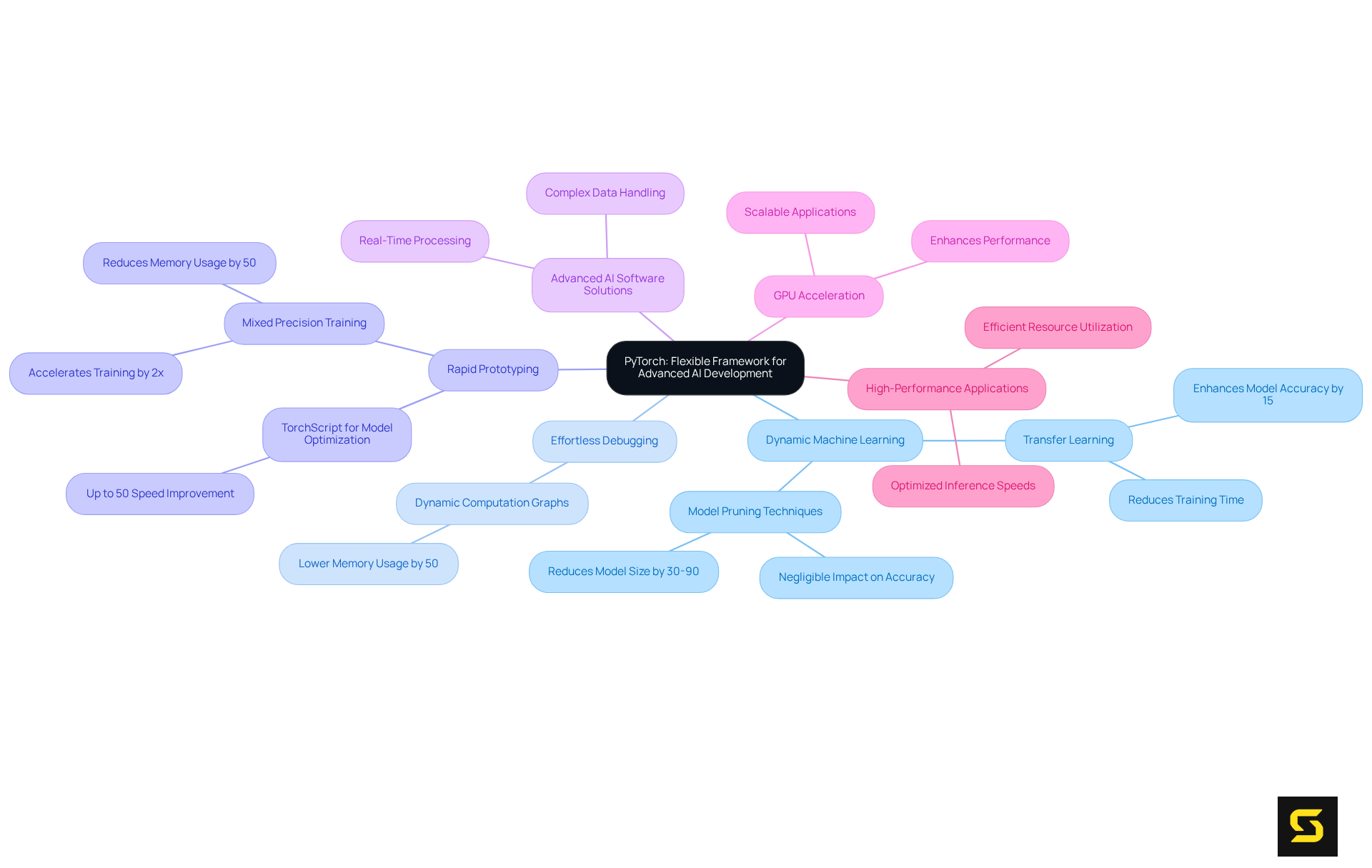
Automation Tools: Streamlining Software Development Processes
Automation tools are crucial in transforming software development processes, significantly diminishing manual tasks and reducing errors. Technologies such as CI/CD pipelines, automated testing frameworks, and deployment scripts enable teams to focus on coding and innovation rather than repetitive activities. The DORA report reveals that a 25% increase in AI adoption is associated with a 2.1% rise in productivity, highlighting the tangible benefits of incorporating automation into workflows.
By leveraging automation, software owners can:
- Expedite their development cycles
- Enhance code quality
- Ensure consistent delivery of features and updates
This transformation not only boosts team efficiency but also accelerates time-to-market for new offerings, allowing companies to respond swiftly to market demands. Real-world instances further underscore this trend: organizations employing automated testing have reported significant improvements in release stability and a decrease in deployment risks, demonstrating the concrete advantages of integrating automation into their workflows.
To initiate the adoption of CI/CD practices, SaaS product owners should:
- Define measurable objectives
- Pinpoint key areas for automation, ensuring alignment with team priorities.
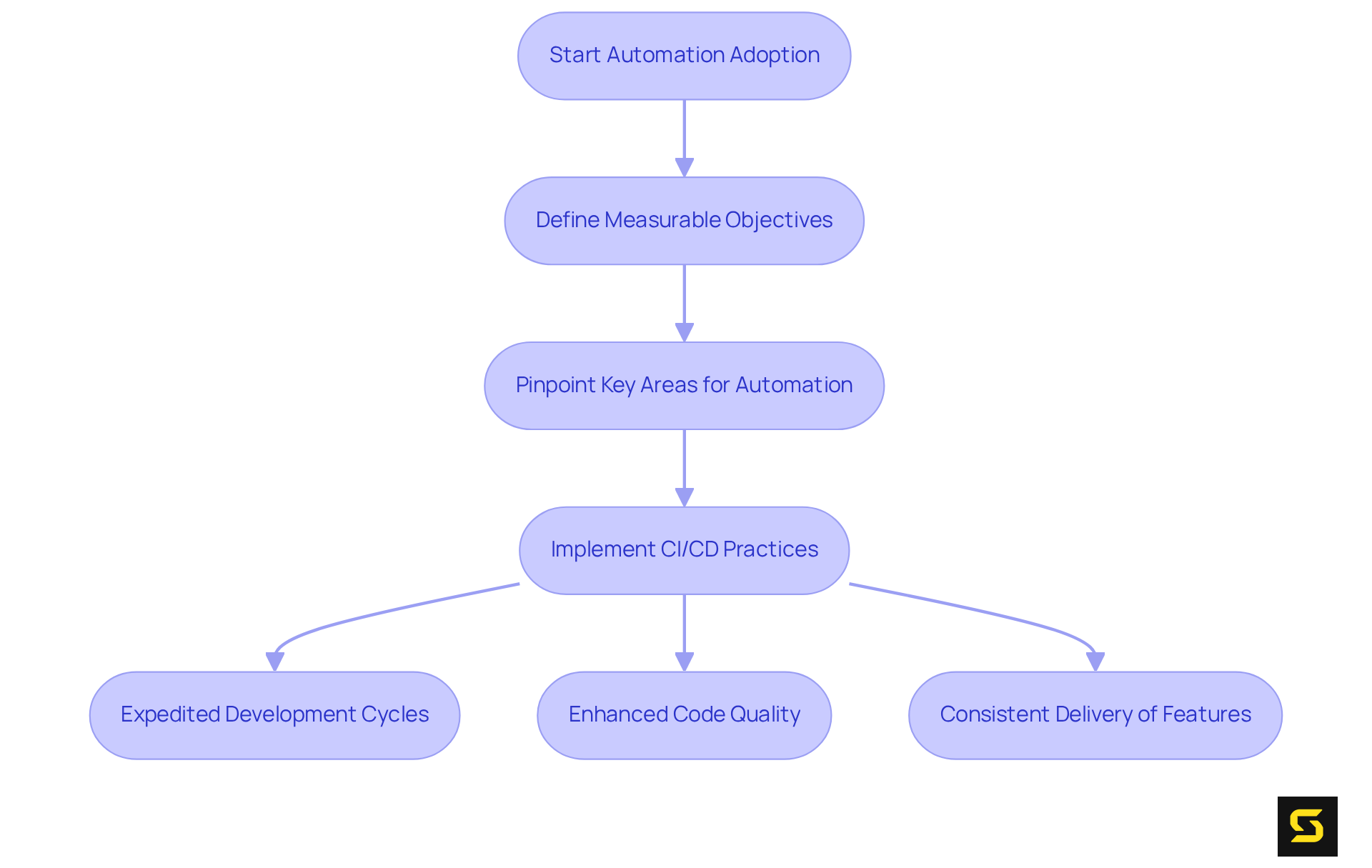
AI Bug Detection Tools: Enhancing Software Quality and Efficiency
AI bug detection systems leverage advanced machine learning algorithms to identify and rectify bugs in code more efficiently than traditional methods. By analyzing code patterns and historical data, these systems can predict potential issues, empowering developers to address them proactively. The integration of AI software development solutions into development processes enables SaaS product owners to markedly enhance software quality, slashing debugging time by as much as 50% and boosting overall customer satisfaction.
For instance, solutions like DeepCode AI and SonarQube AI excel at uncovering subtle bugs and performance issues that manual inspections often overlook, yielding more reliable application performance in real-world scenarios. As Wioletta Baranowska, a Project Manager, observes, "AI helps to avoid common errors and produce cleaner, more dependable code."
This proactive approach to quality assurance not only guarantees that applications operate optimally but also cultivates a more efficient development cycle, ultimately enhancing the user experience with AI software development solutions.
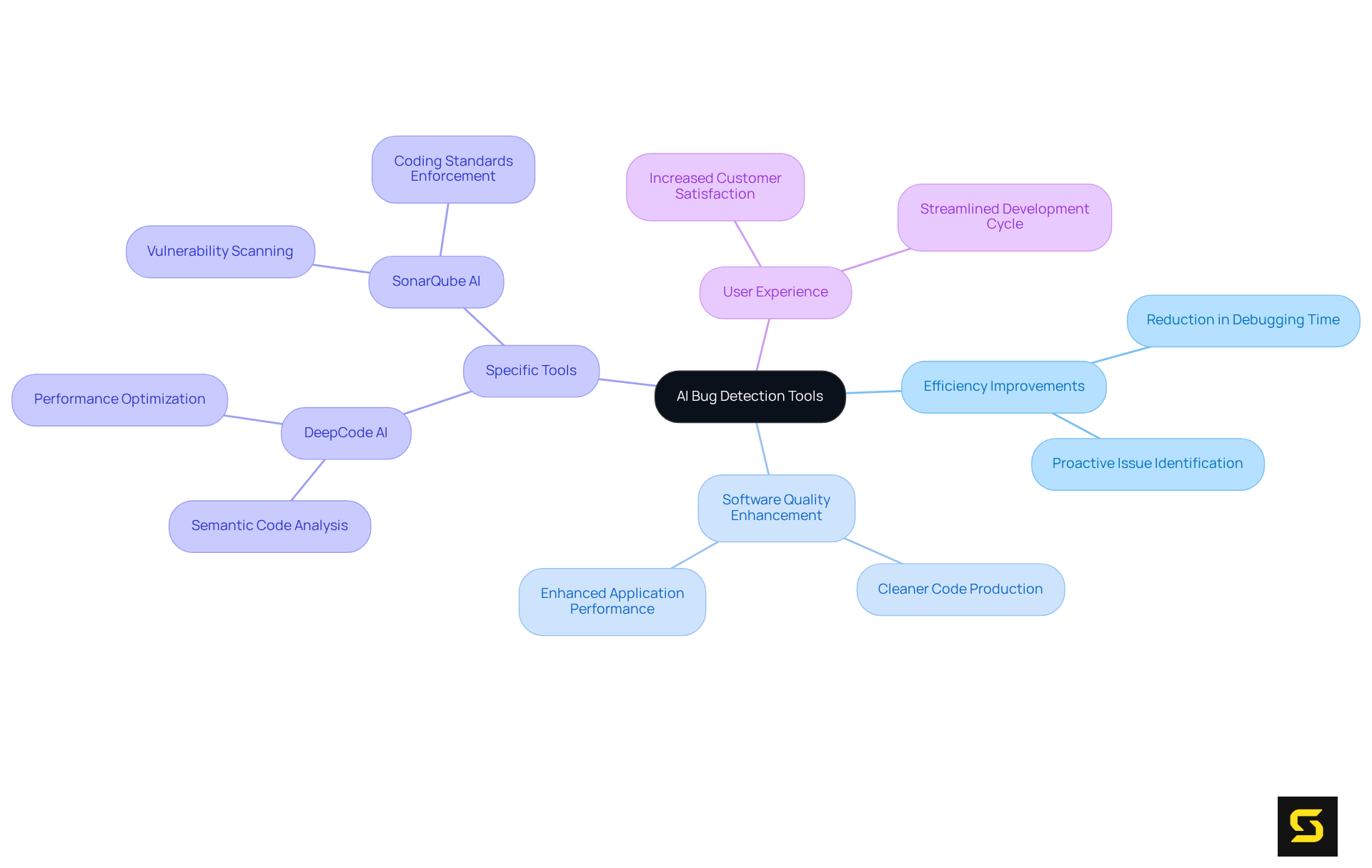
AI-Enhanced DevOps Tools: Bridging Development and Operations
AI-enhanced DevOps solutions are revolutionizing collaboration between development and operations teams by automating workflows and delivering real-time insights. These sophisticated tools analyze performance metrics, predict system failures, and optimize resource allocation, leading to significantly more efficient operations.
For software as a service owners, embracing AI software development solutions and DevOps practices streamlines deployment processes, reduces downtime, and enhances the overall reliability of applications. This integration not only improves operational efficiency but also fosters a culture of continuous improvement and innovation.
Real-world evidence shows that organizations utilizing AI in their DevOps practices achieve:
- 52% faster recovery time
- 45% lower failure rate of new releases
This highlights the profound impact of AI on operational success.
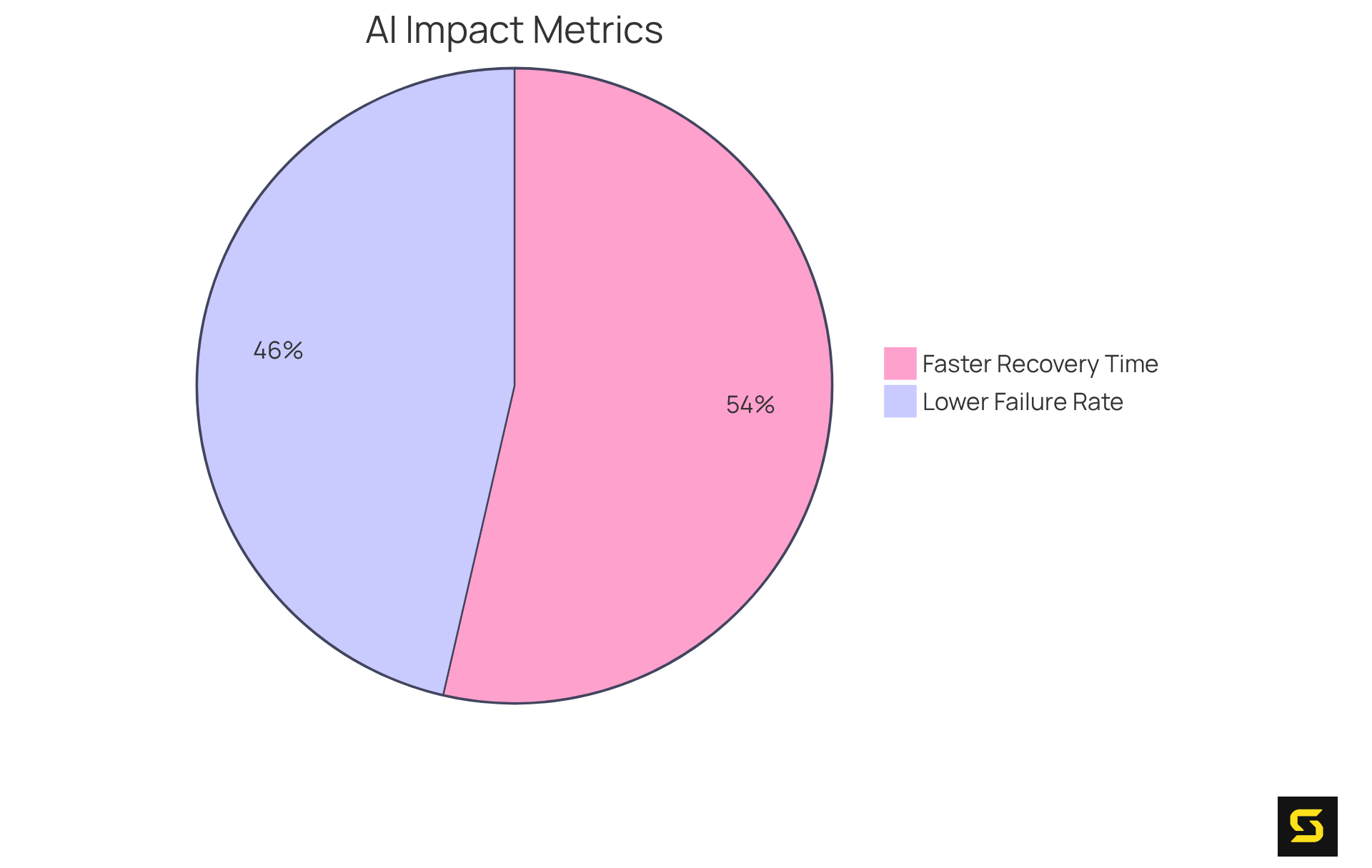
No-Code Development Platforms: Empowering Users with AI
No-code development platforms empower individuals lacking technical expertise to craft applications through visual interfaces and pre-built components. By integrating AI capabilities, these platforms offer AI software development solutions that provide intelligent suggestions and automate complex processes, thus broadening the accessibility of application development.
SaaS product owners stand to benefit significantly by leveraging no-code platforms, enabling users to create tailored solutions that meet their specific needs. This not only enhances engagement and satisfaction but also accelerates development timelines. Moreover, it fosters innovation, allowing individuals to experiment and iterate on their ideas without the constraints of traditional coding.
Embrace the potential of no-code development to transform your application strategy and drive meaningful results.
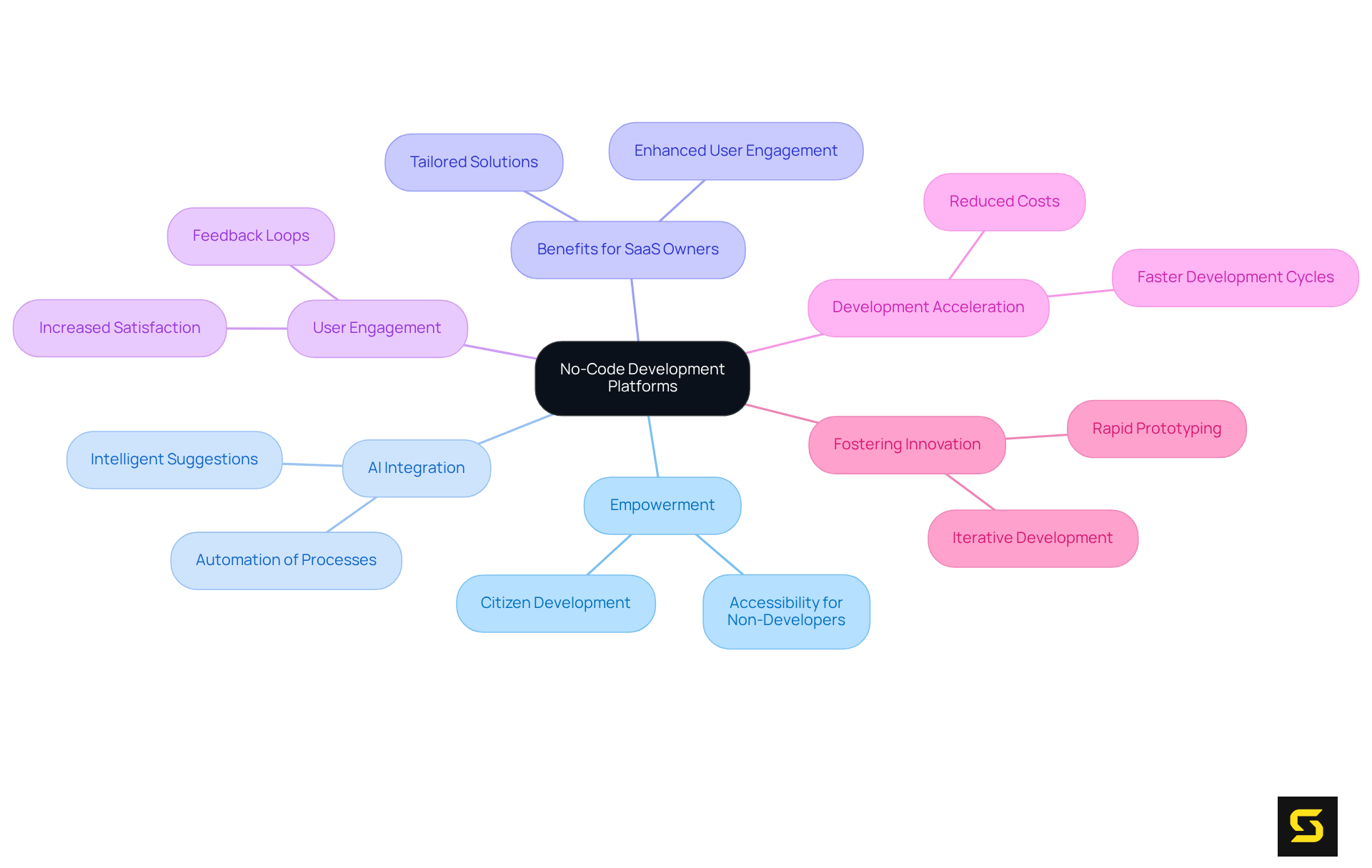
AI Analytics Tools: Driving Data-Driven Software Enhancements
AI analytics systems leverage machine learning algorithms to scrutinize extensive datasets and extract actionable insights. These tools identify behavior patterns, forecast trends, and provide recommendations for enhancements. For software as a service product owners, the adoption of AI software development solutions is crucial for utilizing analytics tools to make data-driven decisions that elevate client experiences and stimulate product innovation.
By understanding client needs and preferences through thorough data analysis, SaaS firms can tailor their offerings to meet market demands, ultimately leading to improved customer satisfaction and retention. In fact, a striking 70% of customers abandon a company because they feel neglected, underscoring the necessity of grasping user needs.
Organizations that emphasize data-driven decision-making have experienced notable gains in customer retention metrics; for example, investing in a robust Customer Success program can yield an impressive 91% return on investment over three years.
Furthermore, as PwC asserts, 'In today’s competitive market, the expectations for customer experiences are higher than ever,' emphasizing the critical need for implementing AI software development solutions to meet these expectations.
Addressing the disparity between company perception and customer reality is equally essential, as 80% of companies believe they deliver superior service, yet only 8% of customers concur.
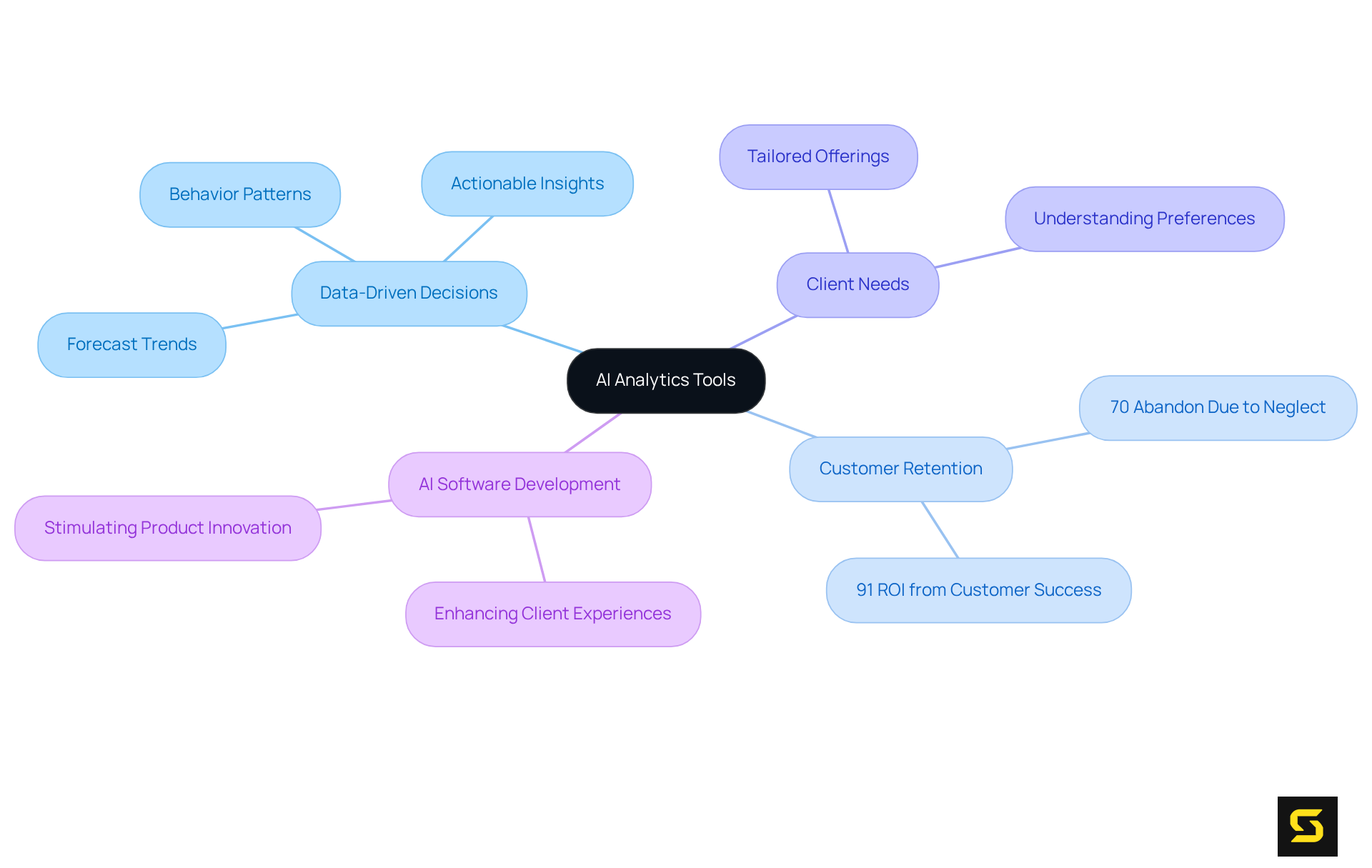
AI Project Management Tools: Optimizing Software Development Workflows
AI project management applications leverage the power of artificial intelligence to automate administrative tasks, optimize resource allocation, and enhance team collaboration. By analyzing project data, these tools can forecast potential delays, suggest task prioritization, and facilitate seamless communication among team members.
For software as a service product owners, utilizing AI software development solutions in project management can lead to significant improvements in project efficiency. Studies indicate that:
- 59% of users employ AI for task automation
- 40% for expediting project completion
- 33% for resource allocation
This not only diminishes overhead costs but also guarantees timely delivery of features and updates. By harnessing AI, teams can redirect their focus from routine tasks to strategic initiatives, ultimately driving superior project outcomes.
Real-world examples reveal that organizations utilizing AI software development solutions have reported enhancements in project delivery timelines, with 41% of project management experts observing substantial improvements since adopting these solutions. Furthermore, organizations demonstrating project management maturity in scope, budget, schedule, and performance measurement achieve a project success rate of 92%.
As AI software development solutions continue to advance, their influence on project management will only intensify, making them a critical element for success in the competitive SaaS landscape.
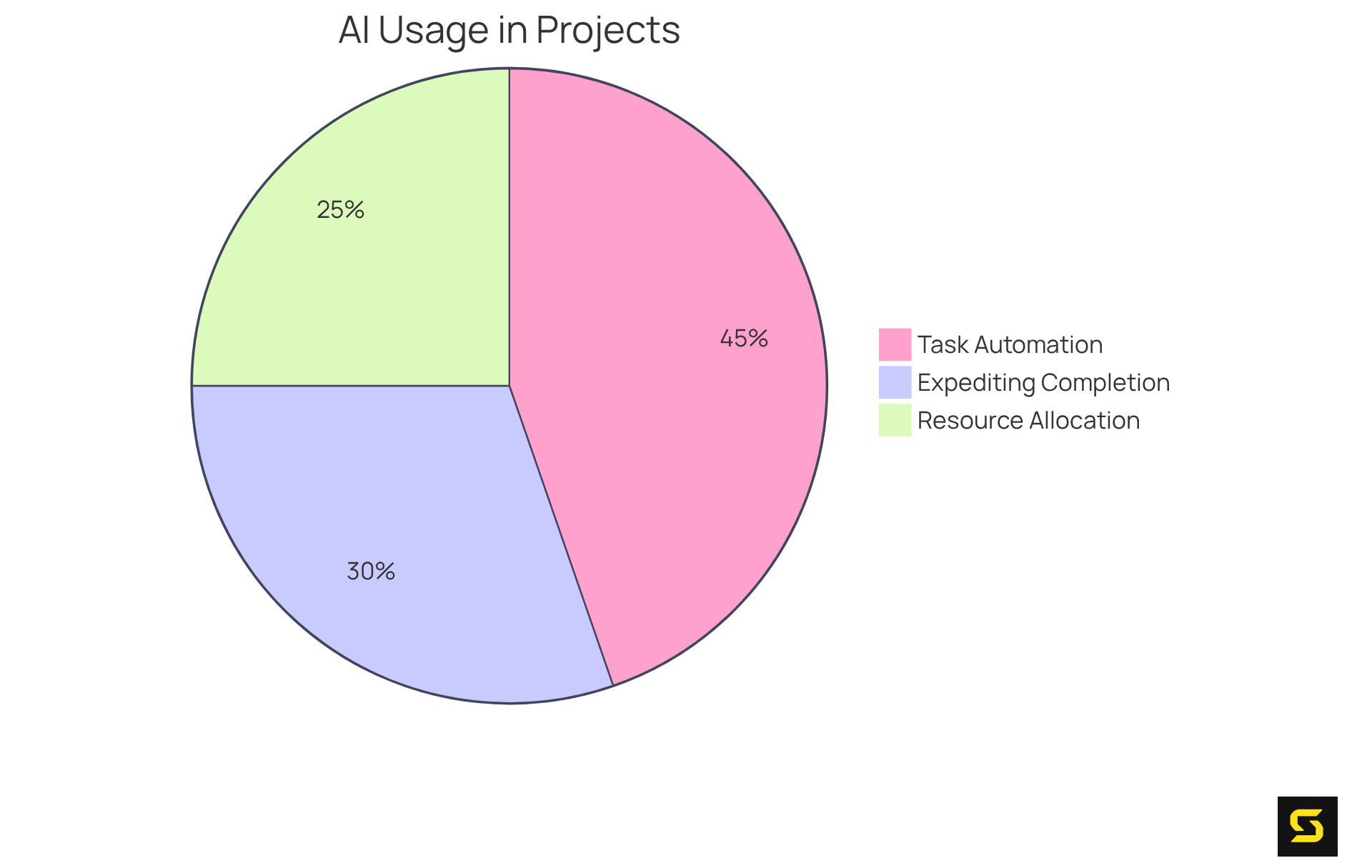
Conclusion
Embracing AI software development solutions is no longer merely an option for SaaS product owners; it has become a strategic necessity. By integrating advanced AI technologies, businesses can significantly enhance their software offerings, streamline development processes, and ultimately deliver superior user experiences. The transformative power of AI drives operational efficiency and positions companies to maintain a competitive edge in an increasingly crowded marketplace.
Throughout this exploration of AI solutions, key tools such as GitHub Copilot, TensorFlow, and PyTorch have been underscored for their capabilities in improving coding efficiency, building intelligent applications, and facilitating advanced AI development. Furthermore, automation tools, AI bug detection systems, and AI-enhanced DevOps solutions have proven to significantly enhance software quality and streamline workflows. These insights highlight the profound impact that AI technologies can have on productivity and innovation within software development.
As the landscape of software development continues to evolve, embracing these AI-driven solutions will be crucial for success. SaaS product owners are urged to leverage these technologies not only to meet current market demands but also to anticipate future trends. By investing in AI software development solutions, organizations can unlock new opportunities for growth, drive customer satisfaction, and remain competitive in a rapidly changing digital environment.
Frequently Asked Questions
What is SDA and how does it integrate AI in custom software development?
SDA is a leader in custom software development that integrates AI technologies to provide innovative solutions tailored to various industries. By leveraging AI, SDA enhances client experiences and drives business growth, making it a strategic partner for software-as-a-service providers.
What benefits does AI integration provide in software applications?
The integration of AI allows for the creation of smarter applications that adapt to user behavior, optimize processes, and generate valuable insights. This enhances operational efficiency and provides a competitive advantage in the market.
What is GitHub Copilot and how does it assist developers?
GitHub Copilot is an AI-powered coding assistant that offers real-time code suggestions and completions. It analyzes the context of the code being written, enabling developers to focus on higher-level design and logic, thereby improving efficiency and code quality.
How much can developers increase their productivity using GitHub Copilot?
Developers using GitHub Copilot report completing coding tasks up to twice as fast, resulting in a 26% increase in overall productivity. Additionally, it boosts weekly code commits by 13.5% and compilation frequency by 38.4%.
What is TensorFlow and what role does it play in building intelligent applications?
TensorFlow is an open-source machine learning framework that enables developers to create and deploy intelligent applications across various domains. It supports applications from simple predictive models to complex neural networks and enhances capabilities like image recognition and predictive analytics.
What is the projected growth of the machine learning market?
The global machine learning market is projected to reach $113.10 billion by 2025, indicating a rising demand for AI functionalities in software solutions.
How has TensorFlow impacted the healthcare sector?
TensorFlow has significantly improved patient care and operational efficiencies in healthcare. The AI in healthcare market is expected to grow from $19.27 billion in 2023 to $613.81 billion by 2034, reflecting the increasing integration of AI technologies.
What kind of improvements have SaaS creators seen by using TensorFlow?
SaaS creators utilizing TensorFlow have reported notable enhancements in client engagement and satisfaction, as it enables them to provide insights that resonate well with their audience.
Can you provide an example of TensorFlow's effectiveness in real-world applications?
An example of TensorFlow's effectiveness is its implementation by AXA, which was able to predict the likelihood of serious car accidents with 78% accuracy, showcasing its practical benefits in various sectors.





